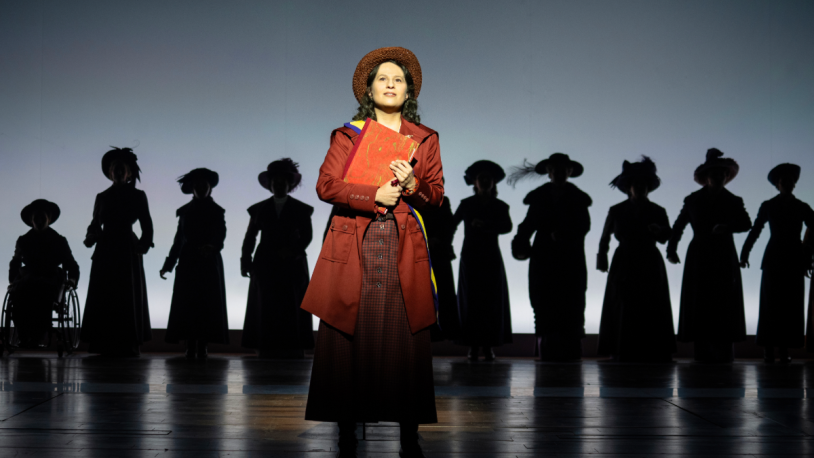It wasn’t just America’s founding fathers who were young, scrappy, and hungry. Shaina Taub’s triumphant new musical Suffs, which opened Thursday at Broadway’s Music Box, is a fascinating and tuneful exploration of the women’s suffrage movement and the trials and tribulations its not-always-harmonious leaders endured to pass the 19th Amendment granting women the right to vote. Taub, who wrote the book and score, also stars as Alice Paul, a young activist who arrives on the suffragist scene in 1913 with a PhD and an impatience to get things done. She finds young allies as well as pushback from more establishment figures like Carrie Chapman Catt (Jenn Collela), who fear that high-profile protests are unladylike and would alienate the men who ultimately will decide the fate of their cause. (Her philosophy of polite persuasion is summed up in her opening number, “Let Mother Vote.”)
It’s tempting to think of Suffs as a distaff version of Hamilton, and it’s clear that Taub has learned a lot from Lin-Manuel Miranda (and not just the virtue of casting herself in the lead role despite having a slender vocal range). Taub follows Miranda in using recurring musical motifs to underscore major themes, and songs like “Find a Way” feel like kissing cousins to “Wait for It” that offer lyrics that resurface in the show as the story progresses. She also shares a deep love of the quirks of history, like a horse-riding socialite (Hannah Cruz) in an historic women’s march on Washington, D.C., or the resignation of one of President Woodrow Wilson’s top aides (Tsilala Brock) over the suffrage issue. And she delights in breaking the fourth wall to comment on some of the wilder absurdities (“Fun fact! He actually said that”).
But Suffs is less concerned with Paul individually than with an entire movement of unique and often conflicting personalities — and the fascinating but often messy matter of building coalitions to get things done. The show becomes a true ensemble effort, perfect for harmony-filled group numbers as well as solos that spotlight noteworthy individuals like Catt, Polish-born union organizer Ruza Wenclawska (feisty Kim Blanck), and Black journalist/activist Ida B. Wells (Nikki M. James, breaking out of her usual ingenue mold with a powerful voice and presence). The inclusion of Wells, along with the more accommodation-friendly Black suffragist Mary Church Terrell (Anastacia McCleskey, a figure of grounded elegance), allows Taub to explore some of the blind spots of its heroines with regard to racial justice — and the bind that Black women found themselves in. Indeed, Wells is introduced with a powerful solo, aptly titled “Wait My Turn,” that forthrightly addresses the contradictions in a cause that sought the support of Black women while relegating them to the sidelines as needed to secure the support of racist Southerners.
Happily, Taub deflects any potential intersectional issues that might surface in her material. It helps that she’s written a series of absolute bangers that engage our ears even as the lyrics provoke us to reconsider classic musical-theater tropes. The show’s lone love song, between Brock’s Wilson aide and the young writer Doris Stevens (wide-eyed Nadia Dandashi), is a rollicking ditty that offers a sly critique of traditional marriage (“If we were married, I’d promise to forfeit my legal autonomy for good”). Meanwhile, Grace McLean tears into her meaty odes to toxic masculinity as the show’s primary villain, Woodrow Wilson. (As usual, the devil gets many of the best lines.)
While Taub has significantly streamlined the show since its premiere at the Public Theater two years ago, subbing in some new songs and paring back the still-padded second act, there is a lot of ground to cover until (spoiler alert!) the 19th Amendment is ratified. While director Leigh Silverman keeps the scenes moving fluidly, the show sometimes has the feel of a big-budget school pageant. Riccardo Hernández’s set features oversize wood panels and white columns that constantly move around the stage; Paul Tazewell’s costumes nod to period details while zhuzhing up the creases, color blocking and hat sizes; and Mayte Natalio’s choreography mostly involves a series of coordinated marches that render the suffrage movement a rather static one.
Taub’s greatest achievement, and there are many to be savored here, may be how she connects this century-old story to contemporary issues in our political life. She’s a creative who thinks deeply about the process of change, as well as the fact of it — the push and pull between progressives and conservatives, radicals and accommodationists, the new vanguard and the established groups. The tensions among the suffragists never deflates into petty squabbling or tabloid-dismissive cat fights, but Taub smartly leans into these conflicts for drama — and illumination. Colella’s Chapman Catt and then Taub’s Paul both come to realize that they have become the “old fogey” in the movement toward gender equality, and that their experience may actually be a drawback to advancing the cause. (As Colella sings in a late solo of self-reflection, “I feel like a parent made to reprimand my child but who is rather pleased to have her do what I always wanted to.”)
Suffs ends on a note of hopeful uplift, as well as a call to action to “keep marching.” That’s a fitting message — progress comes only through perseverance — for a remarkable musical that educates and entertains.

